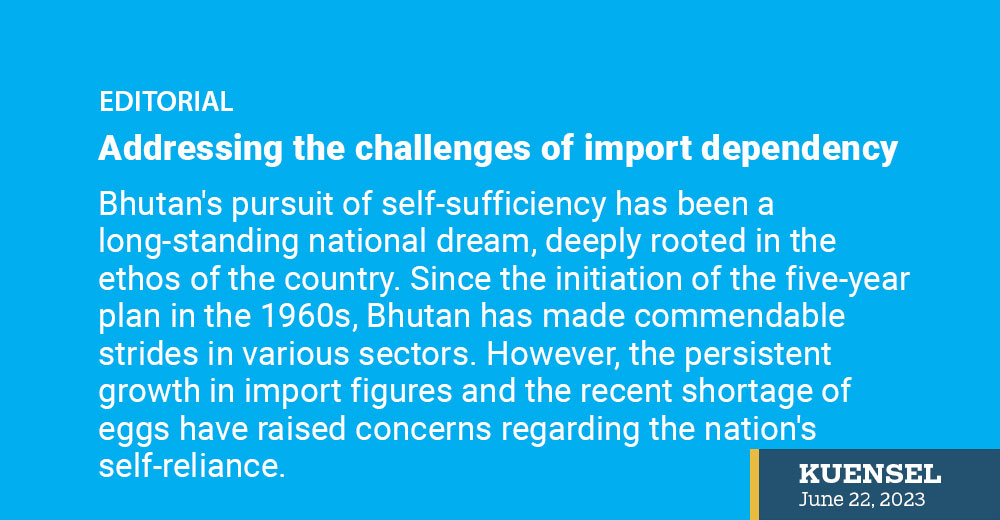Bhutan’s pursuit of self-sufficiency has been a long-standing national dream, deeply rooted in the ethos of the country. Since the initiation of the five-year plan in the 1960s, Bhutan has made commendable strides in various sectors. However, the persistent growth in import figures and the recent shortage of eggs have raised concerns regarding the nation’s self-reliance.
Bhutan’s import figures have been steadily rising, jeopardising the nation’s long-standing aspiration for self-sufficiency. The shortage of eggs serves as a stark reminder of the vulnerability associated with heavy reliance on imports. Dependence on external sources not only threatens food security but also undermines economic stability, social well-being, and national sovereignty. It is imperative for Bhutan to address this issue promptly and decisively.
Agriculture lies at the heart of Bhutan’s economy and self-sufficiency goals. To combat import dependency, there is a pressing need to diversify agricultural practices and promote sustainable farming methods. Encouraging the cultivation of a wider variety of crops, including those that can substitute imported goods, will contribute to a more resilient and self-reliant agricultural sector. By adopting modern technologies, investing in research and development, and providing adequate training and support to farmers, Bhutan can enhance agricultural productivity and reduce the need for imports.
If these recommendations sound very familiar, there is a lot more we can do.
Building robust local industries is essential to decrease import dependency and stimulate economic growth. We should focus on nurturing domestic manufacturing, processing, and value-added industries. This involves identifying sectors with comparative advantages, leveraging the country’s unique resources and expertise, and providing incentives and support to local entrepreneurs. By producing goods domestically, we can reduce imports, create employment opportunities, and contribute to a more self-sufficient and prosperous nation.
To achieve self-sufficiency, we must invest in critical infrastructure. Improving transportation networks, establishing efficient storage facilities, and enhancing connectivity within the country will enable the seamless movement of goods and reduce reliance on external supply chains. Moreover, developing irrigation systems, supporting renewable energy projects, and expanding cold storage facilities will bolster agricultural productivity and reduce post-harvest losses. These infrastructure investments will lay the foundation for a self-reliant Bhutan.
We have tried all these measures, but now is the time to give real purpose to the soul.
Fostering a culture of innovation and entrepreneurship is vital to achieving self-sufficiency. We must create an enabling environment that encourages local startups and small-scale enterprises. Providing access to financial resources, business mentorship programmes, and streamlined regulatory processes will empower aspiring entrepreneurs to develop sustainable enterprises. Supporting initiatives that promote indigenous knowledge, traditional practices, and eco-friendly solutions will also contribute to the nation’s self-sufficiency goals.
Investing in education and skill development is crucial for building a capable workforce and reducing reliance on imported expertise. We must prioritize vocational training, technical education, and research in sectors that align with the country’s self-sufficiency objectives. By equipping the population with the necessary knowledge and skills, we can harness its human capital to drive economic growth, innovation, and self-reliance.
By undertaking these strategic measures, we can steer the path towards true self-sufficiency, ensuring a prosperous and resilient future for our people.The time has come to transform the national dream into a tangible reality, firmly grounded in the principles of sustainability, sovereignty, and self-reliance.


